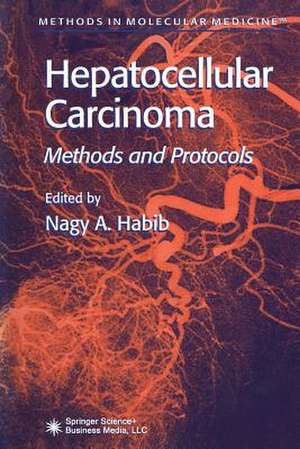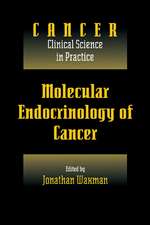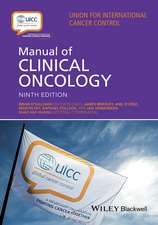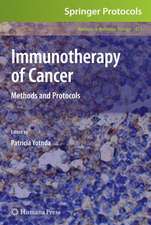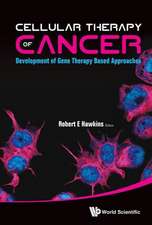Hepatocellular Carcinoma: Methods and Protocols: Methods in Molecular Medicine, cartea 45
Editat de Nagy A. Habiben Limba Engleză Paperback – 11 aug 2013
| Toate formatele și edițiile | Preț | Express |
|---|---|---|
| Paperback (1) | 716.28 lei 6-8 săpt. | |
| Humana Press Inc. – 11 aug 2013 | 716.28 lei 6-8 săpt. | |
| Hardback (1) | 724.70 lei 6-8 săpt. | |
| Humana Press Inc. – 10 mai 2000 | 724.70 lei 6-8 săpt. |
Din seria Methods in Molecular Medicine
- 5%
 Preț: 1278.74 lei
Preț: 1278.74 lei - 15%
 Preț: 655.78 lei
Preț: 655.78 lei - 5%
 Preț: 1106.50 lei
Preț: 1106.50 lei - 5%
 Preț: 727.44 lei
Preț: 727.44 lei - 5%
 Preț: 1108.72 lei
Preț: 1108.72 lei - 15%
 Preț: 650.55 lei
Preț: 650.55 lei - 5%
 Preț: 735.66 lei
Preț: 735.66 lei - 18%
 Preț: 947.35 lei
Preț: 947.35 lei - 18%
 Preț: 948.92 lei
Preț: 948.92 lei - 5%
 Preț: 1114.54 lei
Preț: 1114.54 lei - 5%
 Preț: 1114.91 lei
Preț: 1114.91 lei - 15%
 Preț: 658.55 lei
Preț: 658.55 lei - 5%
 Preț: 734.01 lei
Preț: 734.01 lei - 5%
 Preț: 1111.61 lei
Preț: 1111.61 lei - 5%
 Preț: 1104.32 lei
Preț: 1104.32 lei - 5%
 Preț: 723.21 lei
Preț: 723.21 lei - 5%
 Preț: 1106.13 lei
Preț: 1106.13 lei - 5%
 Preț: 723.05 lei
Preț: 723.05 lei - 5%
 Preț: 1108.35 lei
Preț: 1108.35 lei - 5%
 Preț: 723.42 lei
Preț: 723.42 lei - 5%
 Preț: 1115.65 lei
Preț: 1115.65 lei - 5%
 Preț: 786.86 lei
Preț: 786.86 lei - 5%
 Preț: 1133.01 lei
Preț: 1133.01 lei - 5%
 Preț: 1114.71 lei
Preț: 1114.71 lei
Preț: 716.28 lei
Preț vechi: 753.97 lei
-5% Nou
Puncte Express: 1074
Preț estimativ în valută:
137.10€ • 142.59$ • 114.89£
137.10€ • 142.59$ • 114.89£
Carte tipărită la comandă
Livrare economică 14-28 martie
Preluare comenzi: 021 569.72.76
Specificații
ISBN-13: 9781489941695
ISBN-10: 148994169X
Pagini: 320
Ilustrații: XIII, 302 p.
Dimensiuni: 152 x 229 x 17 mm
Greutate: 0.43 kg
Ediția:Softcover reprint of the original 1st ed. 2000
Editura: Humana Press Inc.
Colecția Humana
Seria Methods in Molecular Medicine
Locul publicării:Totowa, NJ, United States
ISBN-10: 148994169X
Pagini: 320
Ilustrații: XIII, 302 p.
Dimensiuni: 152 x 229 x 17 mm
Greutate: 0.43 kg
Ediția:Softcover reprint of the original 1st ed. 2000
Editura: Humana Press Inc.
Colecția Humana
Seria Methods in Molecular Medicine
Locul publicării:Totowa, NJ, United States
Public țintă
Professional/practitionerCuprins
The Clinical Problem.- Hepatocellular Carcinoma.- Medical Management of Hepatocellular Carcinoma.- HCC Carcinogenesis.- Possible Involvement of the NS3 Protein of Hepatitis C Virus in Hepatocarcinogenesis.- Abrogation of p53-Induced Apoptosis by the Hepatitis B Virus X Gene.- Hepatocellular Carcinoma.- Molecular and Biological Characteristics.- The Impact of Hepatitis B Virus (HBV) and Hepatitis C Virus (HCV).- Mutation of p53 Tumor Suppressor Gene in Hepatocellular Carcinoma.- Diagnostic Markers in Hepatocellular Carcinoma Using Immunohistochemical Techniques.- Assessing Matrix Metalloproteinase Expression and Activity in Hepatocellular Carcinomas.- Isolation of Novel Markers for Hepatocellular Carcinoma by a Subtraction-Enhanced Display Technique.- Measurement of Protein Expression of p53, p21WAF1, and Rb in Patients with Surgically Treated Hepatocellular Carcinoma by Using Catalyzed Signal-Amplification System.- HCC Gene Therapy.- Gene Therapy Vectors Harboring AFP Regulatory Sequences.- Advantages and Disadvantages of Multiple Different Methods of Adenoviral Vector Construction.- Electron Microscopic Assessment of Adenovirus-Mediated Transfer.- p53 Plasmid Preparation and Techniques for Analysis of Gene Transfer and Expression.- Antisense IGF-I for Hepatocellular Carcinoma.- Novel Effective Tumor Vaccines for Hepatocellular Carcinoma.- Immunoglobulin Fusion Proteins as a Tool for Evaluation of T-Cell Costimulatory Molecules.- Adenovirus-Mediated Drug-Sensitivity Gene Therapy for Hepatocellular Carcinoma.- Clinical Protocol for P53 Gene Therapy for Liver Tumors.- Clinical Protocol for p53 Gene Therapy for Liver Tumors.
Recenzii
"...The molecular techniques are presented in a very useful format...This is a unique book with tools presented that can be directly applied to bench, translational, and clinical research. The step-by-step protocols are comprehensive and easy to understand." -Doody's Health Science Book Review Journal
Textul de pe ultima copertă
Advances in molecular characterization and novel gene-isolation techniques have vigorously expanded our understanding of hepatocellular carcinoma (HCC), a form of liver cancer that affects one million people annually, and generated many new therapeutic possibilities. In Hepatocellular Carcinoma: Methods and Protocols, Nagy Habib and a team of basic and clinical researchers describe the wide variety of powerful new laboratory-based molecular methods currently being used for investigating and treating this disease. The book focuses on gene therapy approaches, including the use of such vectors as lipids, adenovirus, and baculovirus, and virus detection assessment using electron microscopy. It also provides preclinical and clinical data on the killing of cancer cells using tumor-suppressor genes, antisense compounds to growth factors, immunotherapy (remove gene), and virus-directed enzyme prodrug therapy. A perspective on future treatment of the failing liver is given, along with a clinical protocol for p53 gene therapy.
Hepatocellular Carcinoma: Methods and Protocols offers experimental and clinical investigators a rich source of both basic science and clinical information on today's optimal use of gene therapy to treat and manage patients suffering from hepatocellular carcinoma.
Hepatocellular Carcinoma: Methods and Protocols offers experimental and clinical investigators a rich source of both basic science and clinical information on today's optimal use of gene therapy to treat and manage patients suffering from hepatocellular carcinoma.
Caracteristici
Includes supplementary material: sn.pub/extras
